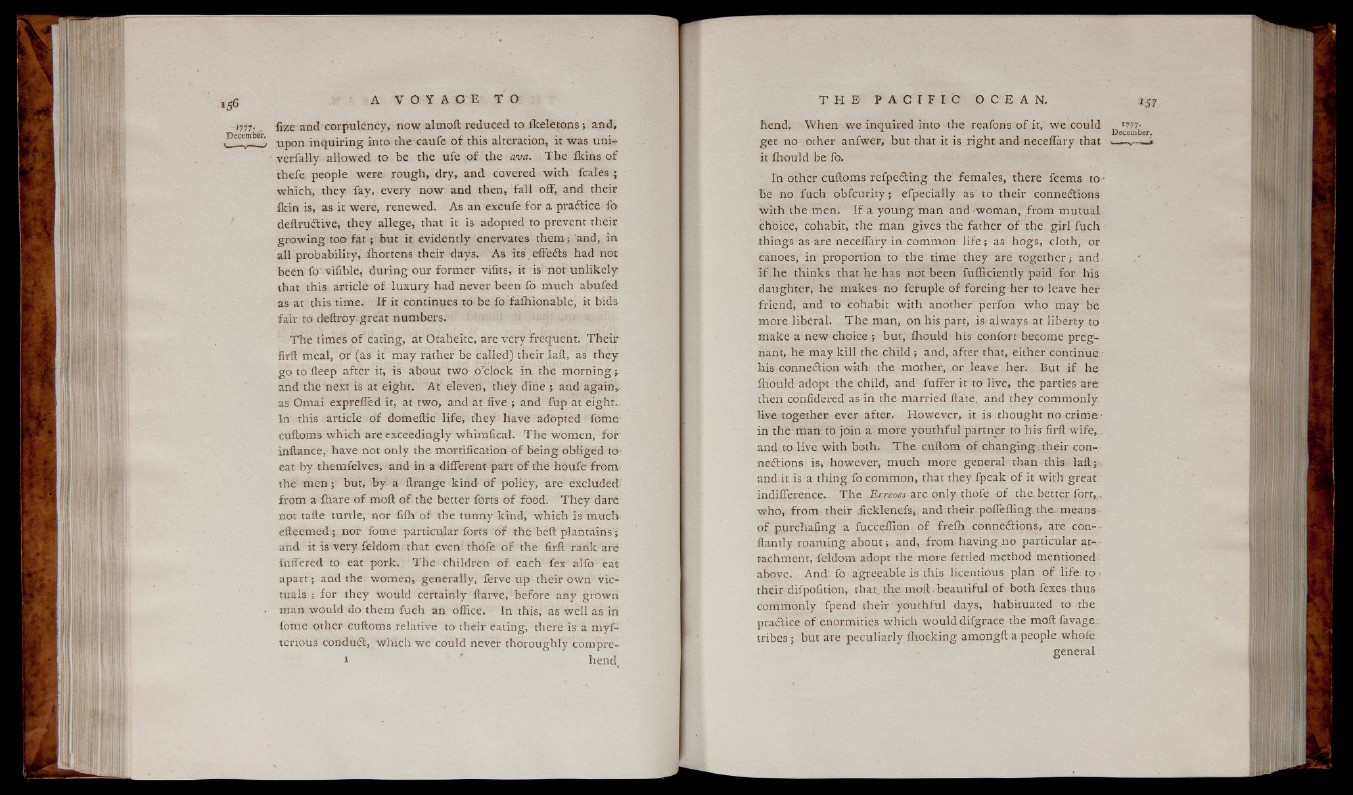
1777- fize and corpulency, now almoft reduced to ike letons; and,
December. in qu irin g into th e c au fe o f this alteration, it was u n i-
■ ve rfa lly allowed to be the ufe o f the ava. T he ikins o f
thefe people were rou gh, dry, and covered w ith fcales ;
which, they fay, every n ow and then, fa ll off, and their
ik in is, as it were, renewed. As an excufe for a practice fo
deftruXive, they allege, that it is adopted to prevent their
grow in g too f a t ; but it evidently enervates th em ; 'and, in
all probability, Ihortens their days. As its effeXs had not
been fo vifible, d uring our former vifits, it is not u n lik e ly
that this article o f lu xu ry had never been fo much abufed
as at this time. I f it continues to be fo faffiionable, it bids
fair to dseftroy great numbers.
T h e times o f eating, at Otaheite, are ve ry frequent. The ir
firft meal, or (as it ma y rather be called) their laft, as they
g o to fleep after it, is about two o’c lock in the morning ;
and the next is at eight. At eleven, they dine and a g a in ,
as Omai exprelied it, at two, and at five ; and fup at eight..
In this article o f domeftic life , they have adopted fome
cuftoms which are exceedingly whimfical. T h e women, for
inftance, have not only the mortification o f being obliged to-
eat b y themfelves, and in a different part o f the houfe from,
the men ; but, b y a ftrange kind o f policy, are excluded:
from a ihare o f moft o f the better forts o f food. T h e y dare
not tafte turtle, nor fifh o f the tunny kind, w hich is much
efteemed ; nor fome particular forts o f the beft plantains ;
and it is very feldom that even thofe o f the firft rank are
fuffered to eat pork. T h e children o f each fex alfo eat
a p a r t ; and the women, generally, ferve up their own vie*
tuals ; for they would certainly ftarve, before any grown
man would do them fuch an office. In this, as well as in
fome other cuftoms relative to their eating, there is a myf-
terious conduit, w hich we could never thoroughly compre-
* I hend.
fiend. When we inquired into the reafons o f it, w e could „ »777-
Decembi
get no other anfwer, but that it is right and neceffary that v—
it fftould be fo.
Ih other cuftoms re fpeXin g the females, there feems to*
Be no fuch o b feu r ity ; efpecially as to their connexions
w ith the men. I f a y o u n g man and-woman, from mutual
choice, cohabit, the man gives the father o f the girl fuch -
things as are neceffary in common l i f e ; as hogs, cloth, or
canoes, in proportion to the time they are to g e th e r ; and
i f he thinks that he has not been fufficiently paid for his
daughter, he makes no fcruple o f forcing her to leave her
friend; and to cohabit w ith another perfon Who may b'e
more liberal. T h e man, on his part, is always at liberty to
make a new choice ; but, ihould his confort become pregnant,
he may k ill the child ; and, after that, either continue
his con n e xion with the mother, or leave her. But i f he
Ihould adopt the child, and Buffer it to live, the parties are
then confidered as in the married ftate, and they commonly -
live together ever after. However, it is thought no crime •
in the man to join a more y o u th fu l partner to his firft w i fe ,.
and to live with both. T h e cuftom o f ch an gin g-the ir conn
ex ion s is, however, much more general than this la ft ;.
and it is a thing fo common, that they fpeak o f it with great
indifference.. T he Emoes are only thofe o f the better fort,,,
who, from their -ficklenefs, and their poffeffing the. means
o f purchafing a fucceffion o f freih con n e xion s , are con-
ftantly ro am in g -ab ou t; and, from having.no particular at- -
tachment, feldom adopt the more fettled method mentioned:
above. And: fo agreeable is this licentious plan o f life; to j
their difpofition, that, the moft beautiful o f both fexes thus
commonly fpend their you th fu l days, habituated to the
praXtce o f enormities which would d ifgrace the moft favage .
tribes ; but are peculiarly ihoeking amongft a people whole
generali